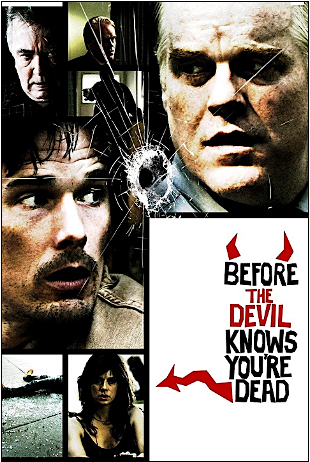The Blame Game
Before the Devil Knows You’re Dead
2007 Director: Sidney Lumet
Starring: Philip Seymour Hoffman, Ethan Hawke, Marisa Tomei, Albert Finney.
Blame it on Rio. Everything that happens, happens for a reason, as people say. And perhaps this is because there is often plenty of blame to go around. And sometimes blame can be assigned because problems weren’t handled when they should have been. This is the case with Andy Hansen (Hoffman), a New York City executive who longs to return with his wife, Gina (Tomei), to their vacation spot in Brazil, a place where everything, including their sex life, seemed better. Unfortunately, Andy has been embezzling funds from his company and allowed the situation to deteriorate. As he faces an audit, he ponders his options.
Andy decides that a “victimless crime” is the solution. He manipulates his younger brother, Hank (Hawke), into helping him, and uses Hank’s insolvency as leverage so he will do it. Hank will rob the jewelry store in the suburbs owned by their parents. Hank strenuously objects to this, but he is not the type to stand up to his brother and not smart enough to find other alternatives. So, he should just go in on a Saturday morning, point a toy gun at the elderly employee and walk out with cash and jewels. What could be easier? Hank decides that he can’t do it alone and enlists a waiter to do the job while he drives the getaway car. But the waiter is also the domineering sort and brings a real gun to the store. Hank’s mother (Rosemary Harris) had to mind the store that morning and, unfortunately, she and the gunman shoot each other.
The story is not told chronologically. It jumps back and forth in time and is told from various points of reference. The brutality of the shooting is an uncomfortable sight. Hank can’t see it from his car, but he is visibly shaken, before and after the gunshots, and leaves in a hurry. We then go back three days before the event, when Hank watches his daughter play baseball; in returning her home, his angry ex-wife reminds him he is late with his child support. Then we go to the day before that, focusing on Andy, a worthless worker who won’t attend an accounting meeting and, instead, goes to a drug dealer, who administers an injection. Is his drug habit the reason for all this? Is this where we lay the blame? We are not told. By telling the story out of sequence, we already know the outcome: we have the benefit of hindsight, which the characters do not. Further, by examining the story from several viewpoints, it helps the viewer realize what went wrong and when. We benefit also from a godlike all-seeing presence that again allows us to see their mistakes and place blame as we choose.
Sidney Lumet’s characters are often pathetic. In his films, they are frequently filled with self-loathing and can rarely solve their own problems. They are seldom intelligent enough to figure out how to get out of their own way in life. Hank is a particularly interesting case: he is easily rattled and we see him drinking much more than we see him working. When faced with Andy’s intimidation, he freaks out and is constantly rattled by all this. He is clearly just a deadbeat who can’t live up to anyone’s expectations of him. But Lumet does not seem to judge or reproach them. Eventually, Andy grabs his passport and suitcase. Will he go to Rio? The scene recalls an earlier one, when he and Gina are in bed and discuss returning there to live. She tells him that there’s no extradition agreement between Brazil and the United States and he laughs at her. Even when presented with various options, these people fall into the traps they have set for themselves.


